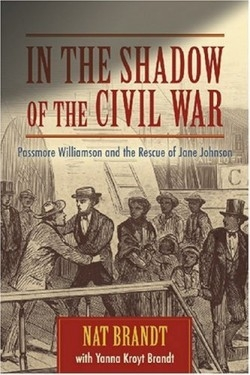In the Shadow of the Civil War
Passmore Williamson and the Rescue of Jane Johnson
It was an unjust law that begged to be broken. The Fugitive Slave Law, passed in 1850, was an act of desperation on the part of Southern slave holders. They increasingly saw people, whom they considered their property, escaping to freedom aided by the Underground Railroad. Instead of securing the slave masters’ “property rights,” the Fugitive Slave Law enraged abolitionists, radicalized average citizens, and set the stage for the conflagration to come.
In the Shadow of the Civil War, by Nat Brandt with Yanna Kroyt Brandt, is a compact and thrilling tale of civil disobedience. Jane Johnson, born a slave, was traveling with John Hill Wheeler, the man who claimed to own her. She desperately wanted freedom for herself and her two young sons. Wheeler brought Jane with him on a journey from Washington, DC, through Philadelphia on his way to Nicaragua. He intended to have Jane serve his wife, but she had other ideas. News of Jane’s desire to escape reached Passmore Williamson, an abolitionist and former Quaker, and William Still, an activist and the child of former slaves. They rushed to the waterfront where Wheeler, Jane, and her two sons were boarding a ferryboat on their way out of Philadelphia:
‘You are the person I am looking for, I presume,’ said Passmore Williamson, turning from the slave master and directly addressing Jane Johnson. Before she could answer, her master asked what he wanted. ‘Nothing,’ said Passmore. His ‘business,’ Passmore said was ‘entirely with this woman.’ ‘She is my slave,’ the master said, ‘and anything you have to say to her you can say to me.’ ‘You may have been his slave,’ said Passmore, ignoring the master and still speaking directly to Jane, ‘but you are now free.’
Jane escaped with the men and the incident became national news. Wheeler, a man with friends in high places, conspired with federal judge John Kintzing Kane to reclaim the three runaways. Passmore spent 100 days in jail on contempt of court charges. Still was acquitted of riot, battery, and assault charges after Jane, at great personal risk, returned from her new home in Boston to testify at his trial. The ramifications over states’ rights—in this case the “Liberty Law,” a Pennsylvania statute that freed any person in its territories—versus federal rights—the Fugitive Slave Law—riveted the nation and exposed both Southern influence and Northern hypocrisy.
Brandt, a former editor at the New York Times, American Heritage, and Publishers Weekly and author of twelve other books, has created a compelling and detailed look into one dramatic rescue and one act of civil disobedience that helped to inspire others to break the hated Fugitive Slave Law.
Reviewed by
Deirdre Sinnott
Disclosure: This article is not an endorsement, but a review. The publisher of this book provided free copies of the book to have their book reviewed by a professional reviewer. No fee was paid by the publisher for this review. Foreword Reviews only recommends books that we love. Foreword Magazine, Inc. is disclosing this in accordance with the Federal Trade Commission’s 16 CFR, Part 255.

